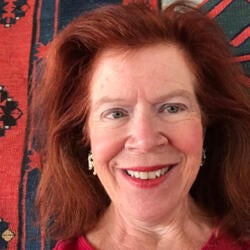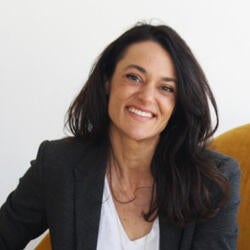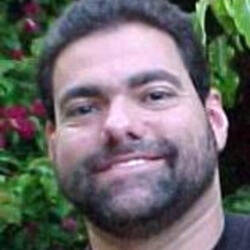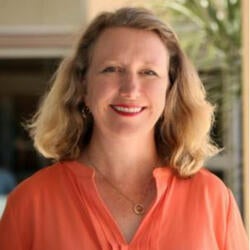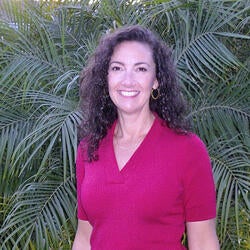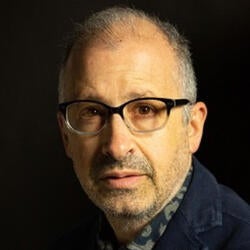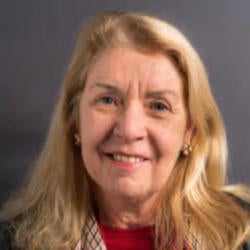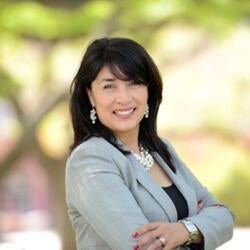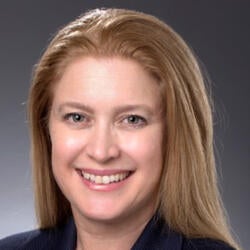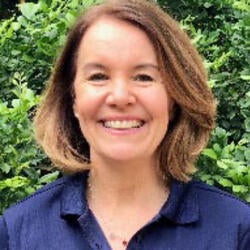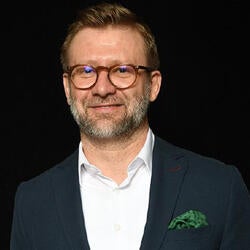
People
| Co-Directors | |
|---|---|
Jody Enders, Founding Director, UCSBPublic speaking is alive. A true living art. For me, it all started with the history, theory, and practice of that age-old tradition known as rhetoric. A theater historian by training and a translator of early French comedy, I had studied the transformation of medieval legal proceedings into some of the very first European plays. As I wrote back in 1992 in Rhetoric and the Origins of Medieval Drama, “From the earliest Greek tragedies to the Farce of Master Pathelin to The Crucible to the contemporary cinematic Return of Martin Guerre, the exposition and resolution of juridical proceedings have always had latent if not blatantly manifest dramatic value. The suspense created by the anticipation of a verdict coaxed from arguments pro and contra has kept audiences spellbound for centuries as spectators and readers awaited that most crucial of legal dénouements: judgment and the attribution of justice.” The drama of justice, persuasion, and advocacy continue to this very day. Whether it’s law, politics, business, education, or the multiple daily instances of persuasion—toasts, eulogies, job interviews, elevator pitches—rhetoric is all about who we are and what we do. Indeed, it tells us a lot about both. Immersed over the years in the ways in which the rhetorical tradition sheds new light on both comedy and tragedy, on both beautiful theories and problematic practices, I became more and more interested in how we might better inspire our students to deepen their commitment not just to the knowledge of practice but to the practice of knowledge. In addition to teaching undergraduate writing strategies and creating, in 1995, “Advanced Critical Writing for Graduate Students,” I later noticed that we had no public speaking curriculum here at UCSB. Thus, a new curriculum was born. From its inception in 2005 with the first lower-division introduction to “Public Speaking,” our Public Speaking Initiative has continued to thrive and grow, now featuring multiple courses in Advanced Public Speaking, workshops, and outreach to the many communities that make for the diversity that is Santa Barbara. We look forward to doing all that we can to help cultivate the pleasure and the power of public speaking. Jody Enders, Distinguished Professor of French, is the author of 4 books on the medieval theater: Rhetoric and the Origins of Medieval Drama (1992), winner of the inaugural Scaglione Prize from the Modern Language Association for the best book in French and Francophone Studies, The Medieval Theatre of Cruelty (1999), Death by Drama and Other Medieval Urban Legends (2002), winner of the Barnard Hewitt Prize from the American Society of Theatre Research, Murder by Accident (2010); and 2 books of performance-friendly translations: The Farce of the Fart and Other Ribaldries: Twelve Medieval French Plays in Modern English (2011) and Holy Deadlock and Further Ribaldries: A Second Dozen Medieval French Plays in Modern English (2017). A past editor of Theatre Survey and Guggenheim fellow, she has published numerous essays on the interplay of rhetoric, medieval literature, performance theory, and the law, garnering praise for her first volume of translated farces from none other than Terry Jones of Monty Python. |
|
Annika Speer, Co-Director, UCRPermit me to open with an anecdote: Recently, a colleague in film told me about his student’s short, dystopian movie. In the film, the student woke up one day to discover that she had permanently lost her voice. Initially distraught, she became resigned when she realized that losing her physical voice hardly mattered because she didn’t use it much anyway. Her world and the world around her changed little if no one could hear her speak. Her work self-reflexively grappled with her understanding about how the prioritization of technology had robbed her of her speech. The student’s film was art imitating life: through email, text, or social media, students are ever more comfortable communicating from behind a screen rather than face-to-face. My students wrestle with the ways in which their reliance on screen-based communication affects them and, understandably, many have immense anxiety about public speaking. The pedagogy of public speaking, which I approach as a form of embodied performance, requires an investment in and appreciation for humanistic presentations in a society that is increasingly tech-driven. My work with students aims not only to normalize the act of speaking in public but also to instill an appreciation for in-person communication as an essential process of critical thinking, storytelling, meaning-making, and connection. The public speaking classroom is a chance for students to hone their arguments and give voice – literally, give their own voices – to their ideas. Public speaking and education in the rhetorical arts are essential, not solely as a class one enrolls in and checks off the list, but as a rigorous discipline with limitless social, political, and epistemological potential. An education in the embodied rhetorical arts empowers students, builds empathy, and contributes to our humanity. Annika Speer is a Professor of Teaching in the Department of Theatre, Film, and Digital Production at UC Riverside where she runs the public speaking program (the largest public speaking curriculum in the UCs, serving more than 520 students per year). She completed her Ph.D. in Theatre Studies at the University of California-Santa Barbara and a Postdoctoral Research Fellowship in Communication at the University of Connecticut. She works closely with numerous campus programs, providing a large variety of public speaking workshops for the Graduate Student Resource Center, the School of Public Policy, the Chancellor Research Fellows, the Science to Policy Certification Program, the Social Entrepreneurship Engagement and Development Lab (SEED), and the Women’s Center, to name but a few. For Professor Speer, it’s a pleasure and a privilege to prepare both graduate and undergraduate students for conference presentations, job interviews, oral comprehensive exams, and other professional speaking endeavors that will allow students to thrive in their respective fields. |
|
| Collaborating Partners and Programs | |
Leo Cabranes-Grant, Professor, UC Santa BarbaraFor Leo Cabranes-Grant, public speaking is indispensable to language teaching. While learning grammar and vocabulary, students are provoked into self-expression through the lens of a new culture. They have to explain their ideas to each other in an organized and persuasive way. The act of talking in front of a group becomes part of their proficiency. It is only by enacting their foreign language as a cohesive statement or argument (accompanied by gesture and motion) that the students develop a sense of comfort and mastery. Public speaking is the potential ground for an interactive pedagogy that can lead to translational efficacy and verbal creativity. |
|
Norah Dunbar, Professor, UC Santa BarbaraDr. Dunbar is a Professor of Communication at UCSB and a Fellow of the International Communication Association. She teaches courses in nonverbal and interpersonal communication, communication theory, and deception detection. She is also Affiliate Faculty in the Center for Information, Technology & Society; Center for Responsible Machine Learning; the Center for Digital Games Research; and the Quantitative Methods in the Social Sciences program. She has received over $18 Million in research funding from agencies such as the Intelligence Advanced Research Projects Activity, the National Science Foundation, the Department of Defense, and the Center for Identification Technology Research. She has published over 100 journal articles, book chapters, and encyclopedia articles and has presented over 120 papers at National and International conferences. Her research has appeared in top journals in her discipline including Communication Research, Communication Monographs, and Journal of Computer-Mediated Communication as well as interdisciplinary journals such as Journal of Management Information Systems and Computers in Human Behavior. She has served on the editorial board of over a dozen disciplinary journals and as the Chair of the Nonverbal Division of the National Communication Association in 2014-2016. She is the immediate past Chair of the Communication Department at UCSB. |
|
Gina L. Genova, Esq., Continuing Lecturer, UC Santa BarbaraGina has taught in the Writing Program since 2000 and is the senior co-director of the Professional Writing Minor's Business Communication track. Along with business writing, she specializes in legal writing and public speaking after a 22-year business litigation career and enjoys working with her students as the faculty advisor for Mock Trial, Moot Court, Pre-law Society, and its Undergraduate Law Journal. Thanks in large part to a push from colleague Jeff Hanson to teach his original Writing for Public Speaking course, Gina cannonballed into the deep end of the speaking pool. Collaborating with another like-minded colleague, Craig Cotich (Editing Minor director), they developed an advanced version of Jeff’s course for the Professional Writing Minor. Believing from her professional experience that oral communication is the most powerful tool in the human kit, she adds speaking units to all her writing courses, holds presentation workshops for UCSB’s Undergrad and Grad Slams, and gives conference and student-org talks on the efficacy of public speaking every chance she gets. She is thrilled to be a part of the PSI and thanks Jody for bringing her in at its inception. Gina’s mission in life is to remind speakers that there is a body attached to their heads and then teach them how to use it effectively in conjunction with their words! |
|
Daniel Gross, Professor, UC IrvineDaniel M. Gross is a UC Irvine Professor of English, where he also serves as the Campus Writing & Communication Coordinator, and as the Director for Excellence in Writing & Communication. As a scholar, he is interested in the history and theory of rhetoric, conceived in early modern terms as the art of moving of souls – now a topic that can be found in affect and emotion studies. Work along these lines includes two books, Being Moved: Rhetoric as the Art of Listening (University of California 2020) and The Secret History of Emotion: From Aristotle’s Rhetoric to Moderate Brain Science (Chicago 2007), as well as articles and advisory board work for professional journals in both writing studies and communication studies. In terms of administration, Professor Gross is interested in why the UC System has traditionally prioritized writing over other types of communication like public speaking, and he has worked to expand this kind of pedagogical attention at his home campus. In 2022 he established a UC Irvine campuswide “Communication” course designation, which enhances the already established “Writing” course designation. A Communication Course must satisfy these six requirements: 1) Teach and assess communication throughout the course 2) Incorporate at least two of five modalities: written, spoken/aural, visual, kinetic, and/or technological 3) Focus on genres and audiences appropriate to the discipline, profession, or public 4) Incorporate a feedback loop on communication assignments 5) Tie at least 25% of the course grade to communication assignments 6) Explicitly list “communication” as a learning objective. |
|
Susan Hackwood, Professor Emerita, Former Dean, Bourns College of Engineering, Senior Policy Fellow, UC RiversideThe Science to Policy program is designed to equip graduate students in STEM disciplines with the necessary skills to actively engage in public policy discussions, drawing on their research and analytical expertise. Our program provides hands-on training and a platform for students to develop the skills required to navigate the policy landscape as effective scientists, communicators, legislative advisors, and science advocates. At the heart of S2P lies the development of communication skills that enable students to articulate complex scientific concepts to policymakers in a clear and concise manner. Through our program, students are equipped not only to tackle societal challenges but also to enhance their scholarly communications, both oral and written. A growing body of evidence suggests that these skills also positively impact the research conducted by the students. |
|
Gladis Herrera-Berkowitz, Director of Engaged Learning, UC RiversideGladis oversees undergraduate research initiatives including the Chancellor’s Research Fellowship, Undergraduate Research Minigrants, the Undergraduate & Creative Activities Symposium, the Undergraduate Research Journal, R’Courses, Capital Internships, and Prestigious Scholarships & Awards. These high-impact programs help students build the confidence to share their ideas and contribute their knowledge to the discipline. By developing strong written & oral communication skills students are able to effectively communicate to broad audiences in an organized and persuasive way. These skills are critical in preparing them for life after UCR, in graduate/professional school, or the workforce. Gladis holds a Bachelor of Arts in Political Science from UC Davis and a Master of Arts in History from the University of San Diego. |
|
Erith Jaffe-Berg, Professor, UC RiversideThe ability to speak, with clarity and confidence, is a skill that serves us all in so many ways. Among the many examples of applications for public speaking are: giving a report to a committee, a final project for a class, a presentation at a conference or a speech before the city council meeting. Advocating for ourselves and others by oral communication is an experience that will guide us all our lives. For these many reasons, public speaking is a skill that should be cultivated within general education. The Public Speaking Initiative (PSI) is a systemwide UC program that aims to provide meaningful public speaking instruction that can be applied in a variety of ways and in many disciplines. I am honored and pleased to be part of this important effort, and I hope that students take advantage of our many course offerings and programming. |
|
Laura McGeehan, Director in Graduate Division for Academic Preparation, Recruitment and OutreachCommunication is at the heart of the mission of Academic Preparation, Recruitment & Outreach. As an example, we coordinate the Grad Slam research presentation showcase for UCR. It is a multi-round event, where graduate students give three-minute presentations on their research both online and in person, to small and large groups, and to non-technical audiences. The competition seeks to empower students to give the strongest presentation that communicates their work and impact most successfully. As such, communication training is absolutely crucial. This is a UC system-wide initiative; our UCR champion will compete with winners from other UC campuses. |
|
Mihai Pătru, SEED LabAmong the many qualities an entrepreneur should present, being able to efficiently communicate their ideas, plans, mission and vision is a must. It is as important as a strong business plan, an innovative product or service, or a forward-thinking plan. Including public speaking and pitch training as part of the SEED Lab Pre-accelerator has been a priority since the program was launched in 2018. Each cohort of startup and early-stage entrepreneurs attending the program has highly benefited from working on their pitches and presentation skills. The impact is immediate and long-term. It boosts their confidence, makes them more comfortable to share their work, and helps them think strategically about their ventures. |
|
